Nadia Sadat, School Management Shura Member
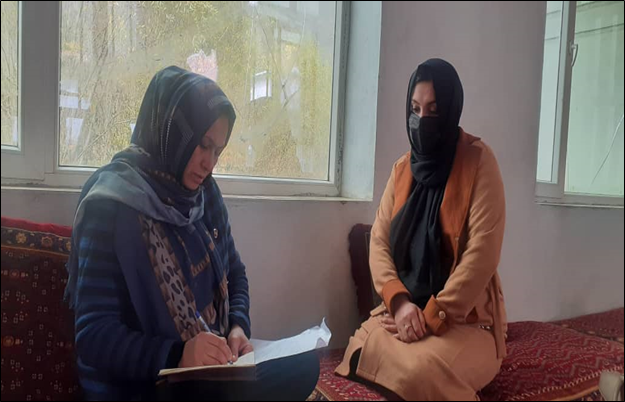
Nadia Sadat, on the right, talks to Child Protection (CP) officer, Baharak, 2022
WADAN implements the Central Asia Institute (CAI) funded Afghanistan Girls’ Education (AGE) project in Badakhshan, which provides basic education through two community-based approaches, Community-Based Education and Accelerated Learning Centers (CBE and ALC.) These approaches are designed to create inclusive teaching and learning environments for girls and boys; while community mobilization and capacity-building activities are the complementing components used to reach this goal.
WADAN has worked to mobilize communities in remote areas to contribute to their girls’ education. Nadia Sadat, from Mahal Mahbas Village in Baharak District, participates in this mission. As a capable and active female member of the School Management Shura (SMS) in her village, she played a vital role when community mobilizers visited her village to identify students and establish a CBE class. Nadia conducted awareness sessions about the crucial importance of primary education, mobilizing women and the parents of school aged children to send their girls to school and she also encouraged those with suitable space available to provide a classroom.
Nadia takes part in regular SMS meetings and provides regular support to the community mobilizers, teachers, and students. She explained the process; “I took part in several sessions about monitoring procedures, community mobilization, and providing social support, and that is when I became informed about community mobilization and how to promote education for girls I found I was able to work effectively.”
Education for Marginalized Children
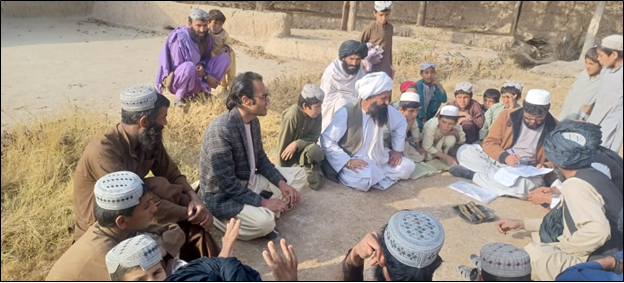
Education team in Helmand seeks community contribution for class establishment. November 2022
Over the past twenty years insecurity caused by ongoing warfare shut down hundreds of schools in Helmand and Farah Provinces. Lack of schools and school supplies limited access to education in the remote areas of these provinces. Starting on October 1, 2022 WADAN began to implement the United Nations Office for the Coordination of Humanitarian Affairs (OCHA) funded Afghanistan Humanitarian Fund (AHF) Education in Emergencies (EiE) project for Afghan Children in Helmand and Farah. This project, which runs through September 30, 2023, provides primary school lessons to 5,400 school-aged children (60% girls and 40% boys) in Khak-e-Safeed and Qala-e-Kah Districts of Farah and Laskhkargah and Nahr-e-Saraj Districts of Helmand.
Using village-based classrooms in Community Based Education (CBE) and Accelerated Learning Center (ALC) interventions WADAN has established 126 schools in Helmand and 54 schools in Farah. During the project’s lifecycle, students and teachers receive learning materials and teachers study pedagogy as well as knowledge of child protection measures. Communities are introduced to the idea of hosting their new schools; people are mobilized and become dedicated to the importance of EiE in their villages through engagement with their School Management Shuras (SMS) with one shura operating in each participating village.
Empowerment of Visually Impaired Women
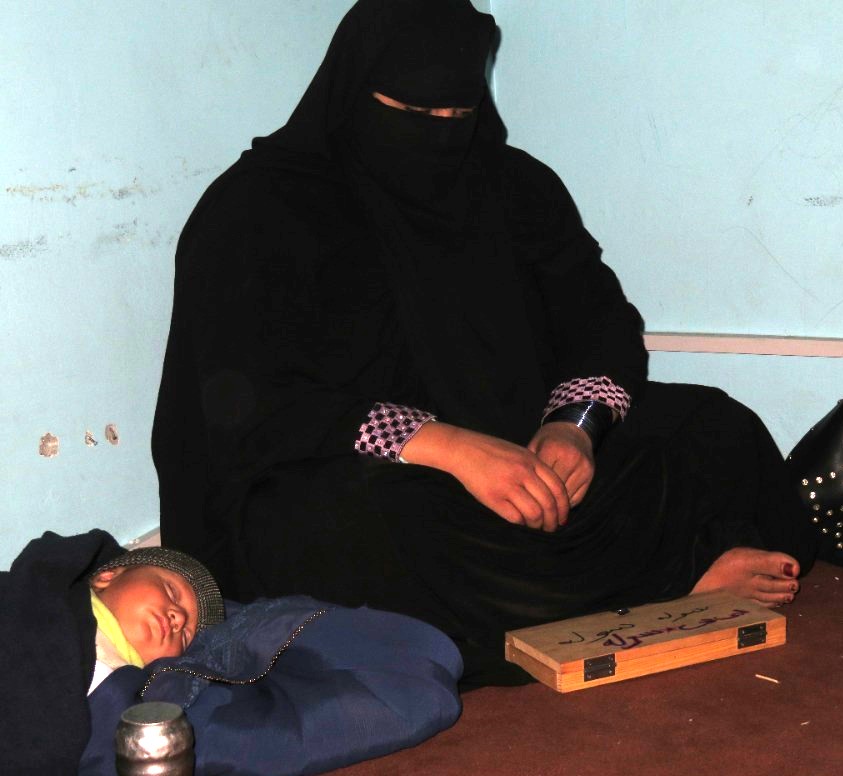
WADAN is currently implementing the UNHCR funded Empowerment of Visually Impaired Women through Income-Generating Activities (EMPOWER) project in Nangarhar, Laghman, and Kunar Province. EMPOWER is a pilot initiative for a period of one year from October 10, 2022 through September 09, 2023.
Through the EMPOWER intervention, WADAN provides services to women that include trainings on Braille, mobility, psychosocial counseling, Gender Based Violence (GBV), the basics of business and other life enhancing skills. Ninety women have been identified and are participating in this project, thirty in each designated province with an overall goal to improve livelihood opportunities for these visually impaired women and to protect and promote their mental health and psychosocial wellness.
To make the participants’ lives and livelihoods more sustainable, they are trained and equipped with income-generating skills and tools, as they are expected to start businesses of their own as the result. Training topics include financial literacy, savings, business development, market demand, and market linkages. Psychosocial services continue throughout this project phase and as well GBV awareness activities and workshops are carried out throughout the target communities to promote prevention and ensure response to gender based disturbances.
Home to Badghis: Artisan and Businesswoman
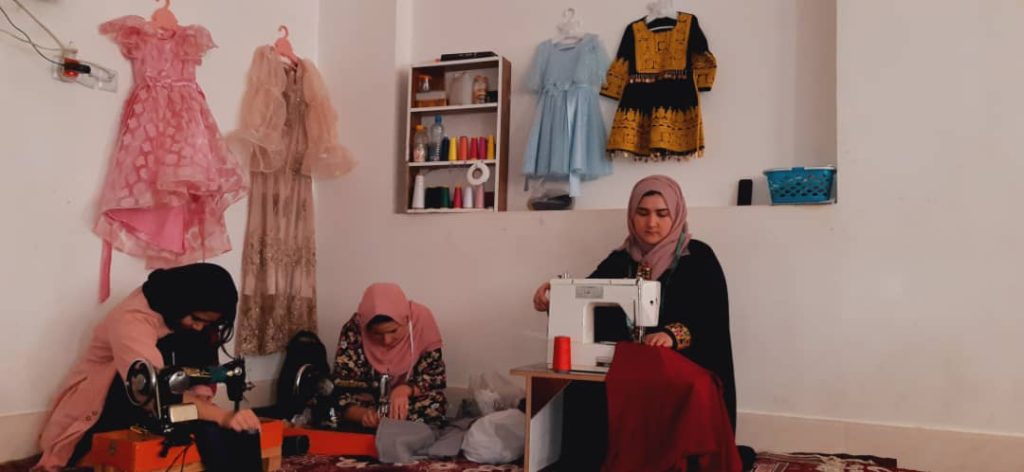
Lailuma Mirzaee was left Badghis Province and fled to to Herat in September 2022 due to both physical and and financial security concerns. Prior to August 2021 her husband had been a security guard at the police headquarters in Badghis; they feared for their future. She said, “We had enjoyed a comfortable life and I was able to attend school in Badghis, but we lost everything and moved to Herat, where we had to adjust to a new environment, we searched for opportunities.” She had learned the art of embroidery from her mother in the years before her wedding in 2019. Lailuma started embroidering and selling her work soon after the young couple settled in Herat. “My meager income was insufficient to meet our basic needs. I certainly could not earn enough to continue my studies either.” Lailuma said.
In January 2022, Lailuma was identified by the UNHCR funded Made in Afghanistan (MaA) project outreach team in Herat; she met all the required criteria and was recommended to the embroidery group. She expressed her happiness about the UNHCR-WADAN intervention in terms of improving livelihoods through supporting artisans and stated, “I gained new designing and marketing skills and learned about the importance of saving money, financial literacy, creating linkages and communications skills, I have been taught entrepreneurship techniques.”
Lailuma is happily settled now, she is self employed and knows how to effectively participate in art and craft exhibitions. In October 2022, some of her handiwork arrived for display and sale in the United States. Recently, Lailuma returned home and has established a business in Badghis where she provides tailoring and embroidery services. She is training three other young women and earns more than 35,000 Afghanis (around USD 395) per month using the business skills she learned during her time with the MaA project. “I feel honored to be able to train women and I can now earn a good income through my own business.” Lailuma said.
Fazela Amini Learns to Teach

Fazela writes a lesson plan, October 2022
Although education for girls beyond Grade Six is officially banned in Afghanistan, Badakhshan is one Afghan province where girls’ schools are in session and where girls attend classes through Grade Twelve. Eighteen-year-old Fazela Amini is a twelfth grade student at Wahdat Girls High School in her isolated village in Argo District. Because of the lack of female teachers in Badakhshan, WADAN, through the Afghanistan Girls’ Education (AGE) project funded by the Central Asia Institute, is committed to work to meet the need for more women who are qualified to teach and offered a six-day capacity building training to train girls who want to become teachers. Students in Grade 12 were introduced to topics in pedagogy; with focus on child psychology, teaching methodology, child protection, and psychosocial support.
Fazela became part of this initiative and has reported that the training topics were new and interesting to her. She said, “Though I have received training in hygiene and health in the past, learning new teaching methodology, pedagogy, and child protection topics was a great opportunity. To become a qualified teacher, this was essential learning.” Following this training, Fazela now feels capable of teaching pupils and her classmates as well. She assists her teachers in class and commented, “I have learned how to motivate children and inspire them to work hard. We now use a variety of teaching techniques.”
Mr. Fayiq, head of Argo’s District Education Department, expressed his appreciation, “Lack of female teachers has been a hindrance that has limited girls’ education in our community, we need girls learning to teach in Afghanistan and this intervention efficiently supports this purpose.”
Shiringul Obaidi
Shiringul weave the carpet, August 2022
Shiringul Obaidi, a UNHCR funded Made in Afghanistan (MaA) project participant from Gulran District of Herat province was widowed in 2011 and moved to Herat City that year to find work that would support herself and her children. “I searched for a source of income in our village could not find one, neither was there a school for the children,” she explained.
She had learned how to weave carpets from her neighbors when she was ten years old and later taught this art to her daughters. Shiringul stated, “My children were working hard, they wove carpets to help support us. But still we lived a miserable life.”
In January 2020, the MaA outreach team found when they were searching through the internally displaced persons community for project participants and recommended that she join the carpet group. When Shiringul joined MaA project, she had no idea about new designs, market demands, marketing, or the communications skills necessary to succeed as an artisan; neither could she afford her children’s education or even their basic needs.
Currently Shiringul produces carpets woven to meet new decorating trends. Since joining MaA, she has made nearly a dozen tapestry clocks, prayer rugs, and large and small carpets. She said, “I have received regular training sessions on new designing skills as I have been taught skills of marketing and how to deal with customers. I am pleased to see my products being displayed in national and international exhibitions. I learned how to effectively take part in exhibitions and how important they are. These skills were unknown to me until I started to learn them in 2020.”
In addition to the 7,000 Afghanis ($81.90) monthly stipend and raw materials Shiringul receives from the project, she has earned more than 20,000 Afs through sales in exhibitions and orders. She summed up her experience with MaA, “This is the first financially sustainable achievement I have ever experienced in my life. I have learned a lot about my art and about financial literacy too. This has inspired me to open a workshop where I will teach these techniques and skills to others; and I will continue to display my work on the national and international levels.”
Sadia Sahar
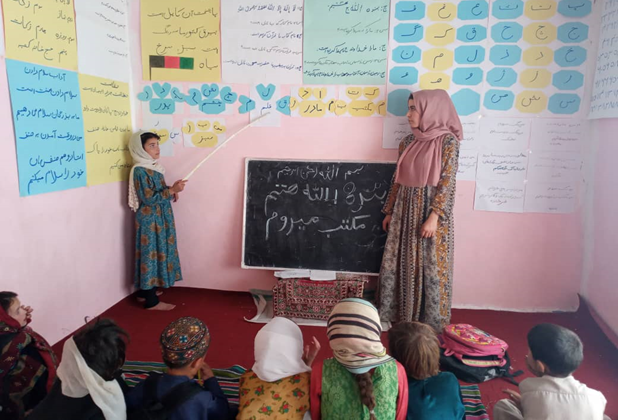
Saida Sahar is committed to pay strong efforts for students’ capacities enhancement. Khash, Badakhshan. July 2022
Ms. Sadia Sahar, who is twenty-four years old, lives with her large family in Kuzar Pitaw Village, Khash District in Badakhshan. Her parents are farmers and supported Sadia’s education and continue to work to support their family. “We are a family of ten and I am the eldest. I completed my studies, but previously had no opportunity to find a job to help support my family. Of course the income from farming is insufficient for our needs.” Sadia said.
Ms. Sahar graduated with a degree in Chemistry from Badakhshan University in 2019 and was felt devastated when she could not find a job for two years. “I was disappointed but kept busy helping my mother with the crops and livestock.” After August 2021, the environment for women changed in Afghanistan, thus, Saida was totally distressed.
In May 2022, Ms. Sahar passed the exams and was hired as a primary schoolteacher under the Afghanistan Girls’ Education (AGE) project funded by the Central Asia Institute (CAI) in her village. In addition to earning a good income, she feels her social status has improved, and the trainings have enhanced her qualifications academically. She has received trainings in pedagogy, psychology, teaching methodology, and child protection measures. When Sadia was hired she made a plan and explained, “I am paid $100 per month and spend some on my family and save some money to start my Master’s degree when I have saved enough.”
There are very few educated women in Kuzar Pitaw. Ms. Sahar commented, “Joining this initiative will inspire girls, who are culturally restricted, to attend school. I am proud to teach 30 pupils and seventeen of them are girls! Additional support will further encourage girls’ education.”
Mahboba

Mahboba, third on the lift, actively participates in the twelve-day AGE core-training course, June 2022
Twenty-three year-old Mahboba and her family live in Dashti-e-Barek-e-Bala, a remote village of Baharak District of Badakhshan. She graduated with a degree in Sharia Studies from the University of Badakhshan in 2021 and started her first job as a teacher in a private school in her village. She lost her job in August when the Taliban restricted girls’ from attending high school and commented, “I was reduced to selling dairy products from my animals to support my family.”
Children from Dashti-e-Barek-e-Bala must walk more than five kilometers to reach the nearest public school. Mahboba was delighted when she saw a job announcement posted on the wall outside the District Education Department office. She met all the criteria set for the Afghanistan Girls’ Education (AGE) community based education (CBE) teacher and she applied for the position in May 2022. “I faced tough competition as there are dozens of qualified and unemployed male and female teachers.”
Mahboba was excited when she passed the written test and the interview. She was hired by the Central Asia Institute (CAI) AGE project in June 2022 and then attended the twelve-day AGE core-training course with topics in pedagogy, methodology, social psychology, and child protection. She said, “I gained new teaching skills and an understanding of the importance of psychosocial issues, which I believe will benefit my pupils. I am happy to have this job and be instrumental in helping children learn, but I still suffer when I see other children wandering the street or forced into hazardous child labor, those who have no access to education deserve better. We need another AGE class in my village.”
Shafiullah
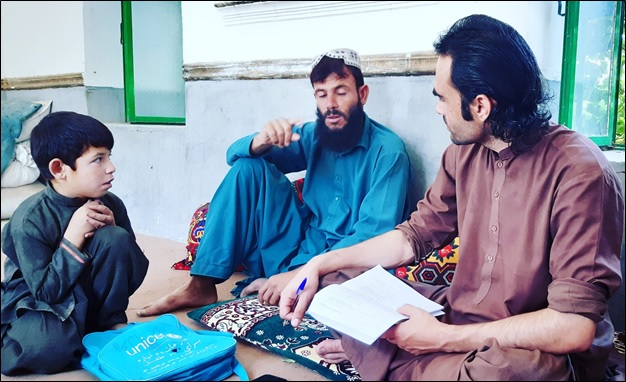
Shafiullah, moved to the second grade by getting high score. Farah, June 2022
Eight-year-old Shafiullah lives in Garani Village, Balaboluk District in Farah Province with his parents and three sisters. Insecurity and continuous warfare have hindered children’s access to education for more than twenty years in this village. Shafiullah’s family suffers from extreme poverty in large part due to the fact that his parents are illiterate. From Garani Village the children must walk through the desert for more than five kilometers to attend a government school; this too is a major determent for village children’s access to education. Abdul Ali Agha, Shafiullah’s father stated, “My son is talented and I would have loved to take my family to live in Farah City and enroll my children in school but I could not afford to move there because the cost of living would be too high for us.”
Children wandered the streets of Garani and were forced into hazardous child labor before the Community Based Education (CBE) started in November 2021 initiated by WADAN and funded by UNICEF under the Global Partnership for Education (GPE). Shafiullah worked with his father in farming to help support his family but he was identified as a talented child and eligible for the CBE class. In July 2022, he completed the first grade with the highest performance and passed the exams. “I will try to stay in first place until I complete higher education; I will be a doctor one day.” Shafiullah said.
Shafiullah studied reading, writing, and drawing. He commented, “My other classmates are also good students, we all are working for a brilliant future and we are excited and have high hopes to study further and complete our higher education.
The Garani community elders and members of School Management Shura (SMS) ask for the continuation of CBE approach and ask for additional support as hundreds of boys and girls are still out of school.
Arzogul and the Tajekha Village CBE Class

Arzogul and Habiba, June 2022
Twenty-seven year-old Arzogul, her husband and their daughter live in Tajekha, a remote village in Khash District, Badakhshan. Due to changes in Afghanistan over the past year, the family was impoverished before she joined the Central Asia Institute (CAI) funded Afghanistan Girls’ Education (AGE) community based education project as a schoolteacher. She said, “I graduated from university eight years ago and taught at a private school for seven years, but I lost my job and my husband lost his job in the police department when the government changed in August 2021. We have survived by selling dairy products from our own animals.”
Teaching is Arzogul’s passion and she was excited to apply for the AGE teaching position when she learned of the opportunity in her village. She saw the job announcement posted outside the District Education Department (DED) office and the village Shura also informed her about the position. Arzogul applied and in May 2022, she was hired. The AFN 9,000 salary per month is sufficient for her little family.
Twelve days of capacity-building training for teachers is included under this project, with topics including teaching methodology, pedagogy, child protection and social psychology. WADAN delivered these core-training sessions to all AGE teachers in June 2022. Arzogul commented, “I learned essential new information, improved my knowledge of pedagogy, and worked to upgrade my teaching skills.”
There are 30 students in Arzogul’s class, of which 21 are girls. She is happily committed to her work and she is glad when she sees children studying instead of wandering in the streets. Habiba, aged seven, said she has learned a lot, and thanks her teacher for her hard work and love. “We learned the alphabet quickly, and we learned how to draw and paint, these activities are interesting and fun,” she said.
Arzogul is delighted about the community elders’ support for girls’ education and the CBE initiative in her village. She said, “But we still have hundreds of children out of school; this village was marginalized for more than two decades, we have lived with no access to education. Girls particularly suffer from lack of schooling and additional support is needed.”

Arzogul in her classroom, June 2022
Arifa Rohani

Now 35, Arifa Rohani is a “Made in Afghanistan” project participant from the project’s host community in Herat City. She completed her fine art studies at the University of Herat in 2010. Arifa’s father died when she was six years old. She explained the family’s situation, “We were destitute. When I graduated from university, I had to work to support my family, but my income was insufficient to meet our needs.” In 2011, Arifa opened a small art gallery near her home to exhibit and sell her calligraphy and paintings. She said, “I had no marketing approach, and could not earn enough to afford the rent of the premises or to buy supplies. I felt miserable and closed my gallery.”
However, after some years passed, Arifa was discovered by the WADAN outreach team and delighted when she was notified that she had met the project selection criteria for “Made in Afghanistan.” She joined the project on March 15, 2021. Arifa learned marketing skills and developed her design skills, she received a financial allowance, a monthly stipend to buy supplies; her ambition was revived and her artwork was nourished. She became an entrepreneur with her newly acquired business acumen. She said, “I also gained salable skills including painting on wood, pottery and glass. I have become prominent in Herat City.”
Arifa earns a regular income that averages more than AFN 10,000 per month through sales in Afghan and international exhibitions. In the US, her work has been sent to Massachusetts, Vermont and Washington DC. Handpainted storybooks and drawing and design work that includes painting on clothing and hand-blown Herat glass are Arifa’s current projects. “I was very inspired when my products were exhibited internationally; this would have been unimaginable before joining “Made in Afghanistan.” I was delighted when my work went to the United States. I wanted to understand how to approach international markets as I have learned how to take an active part in the local exhibitions. I have learned the skills that contribute to sustainable entrepreneurship and I will make my work sustainable.

Asma Studies
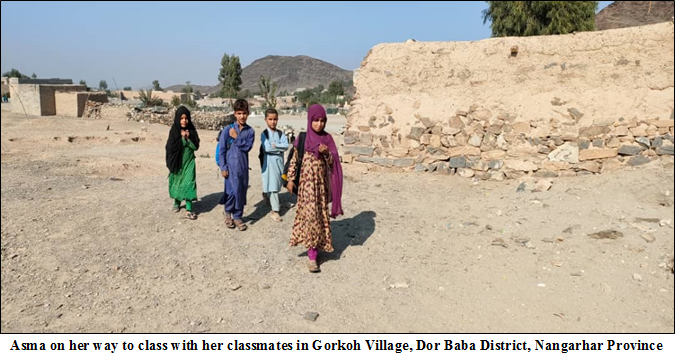
Asma is a nine-year-old girl who was forced by her father, Waziristan, to work at the Torkham border crossing due to the severe poverty her family is suffering from. She lives with her parents, four brothers, and three sisters in Door Baba Village which is located in Gorkoh District, Nangarhar Province. It is a mountainous village on the border between Afghanistan and Pakistan. “We walked for an hour every day to Torkham, I loaded and pushed a cart with travelers’ luggage between Afghanistan and Pakistan. My little body couldn’t do this heavy work.” Asma said.
Asma and hundreds of other boys and girls in Dor Baba were deprived of education as accessibility to public schools was hindered due to lack of schools in their territory, poverty, impassible routes, and remote mountainous locations. This area was identified in severe need of Community Based Education (CBE). WADAN community mobilizers and child protection teams established a CBE classroom in Gorkoh on July 1, 2019. The location was a Malik’s guest room donated for CBE. Asma started to study there but along with four other classmates she was forced to drop out and was forced to go to work in Torkham.
Child Protection Officers and the CBE teacher immediately met with the children’s parents, Mullahs, and community elders to try to convince them to keep their children in the class. Mullahs and Maliks were mobilized! Child Protection Officer Maiwand Momand, said, “Training messages were delivered about child protection, the importance of education, and community mobilization.” The Maliks and Mullahs began to advocate for children’s rights. Mohammad, a prominent Mullah in the Gorkoh Village, used the mosque for community mobilization and motivated people through his Friday sermon and in other gatherings too.
Asma and the other children returned to school. She is happy to be there with her siblings and classmates. She anticipates a brilliant future, “I am studying now. I want to be a doctor.” Nakhtar Lal, the CBE teacher, was impressed by this development. He said, “I was suffering when I saw these little girls and boys going to Torkham every day, but now I am happy as the Child Protection team and I were able to convince Mullahs and then the parent to support education. They all are committed now. Thanks to WADAN and thanks to UNICEF.”
